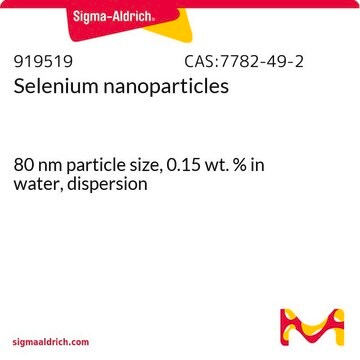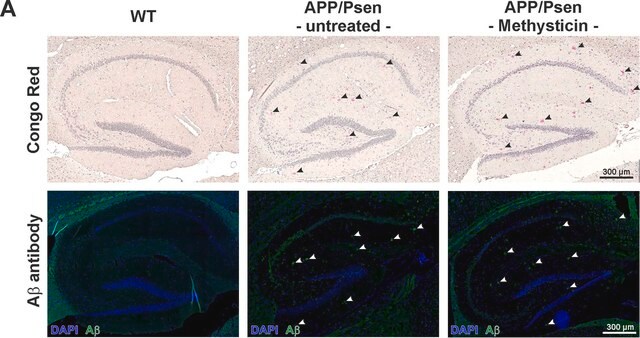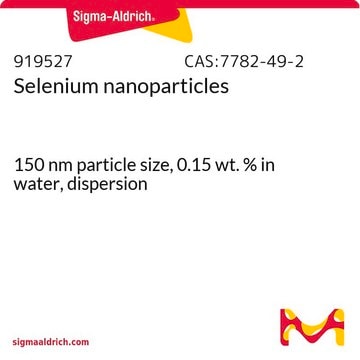938297
Selenium nanoparticles

40 nm particle size, 0.03 wt. % in water, dispersion
Synonym(s):
Selenium nanoparticles, Selenium nanoparticles dispersed in water
Sign Into View Organizational & Contract Pricing
All Photos(1)
About This Item
Recommended Products
form
dispersion
Quality Level
concentration
0.03 wt. % in water
particle size
40 nm
InChI
1S/Se
InChI key
BUGBHKTXTAQXES-UHFFFAOYSA-N
Looking for similar products? Visit Product Comparison Guide
General description
We produce aqueous dispersions of selenium nanoparticles with a monodisperse particle size of 40 nm and high chemical purity. These selenium nanoparticles exhibit strong absorption at 565 nm, resulting in a bright red color, which makes them ideal for staining or as a label in lateral flow applications. Furthermore, selenium (Se) nanoparticles possess remarkable properties such as high photoconductivity, along with significant piezoelectric, thermoelectric, and nonlinear optical responses.We produce aqueous dispersions of selenium nanoparticles with a monodisperse particle size of 40 nm and high chemical purity. These selenium nanoparticles exhibit strong absorption at 565 nm, resulting in a bright red color, which makes them ideal for staining or as a label in lateral flow applications. Furthermore, selenium (Se) nanoparticles possess remarkable properties such as high photoconductivity, along with significant piezoelectric, thermoelectric, and nonlinear optical responses.
Application
Selenium nanoparticles (SeNPs) present higher biocompatibility and lower cytotoxicity than organic or inorganic Se compounds. Selenium nanoparticles have been studied for many therapeutic areas such as cancer, diabetes, Alzheimer′s disease and inflammation-related diseases, such as rheumatoid arthritis. Our 0.15wt% aqueous dispersion of 40 nm selenium nanoparticles are suitable to use in studies of therapeutic areas including treatment of fungal, bacterial, and parasitic infections, cancer, and diabetes. They can be used for targeted delivery of drugs, as contrast agents in medical imaging, and in the development of new therapeutic approaches. Due to its high photoconductivity and low melting point, it possesses great catalytic activity towards organic hydration and oxidation reactions.They have a narrow band gap (~1.7 eV), high absorption coefficient and mobility, which suits to be used as an absorber for high bandgap thin film solar cells. Selenium nanoparticles can be incorporated into solar cell technologies, specifically in the fabrication of thin-film solar cells or dye-sensitized solar cells.
Storage Class Code
12 - Non Combustible Liquids
WGK
nwg
Flash Point(F)
Not applicable
Flash Point(C)
Not applicable
Choose from one of the most recent versions:
Certificates of Analysis (COA)
Lot/Batch Number
Sorry, we don't have COAs for this product available online at this time.
If you need assistance, please contact Customer Support.
Already Own This Product?
Find documentation for the products that you have recently purchased in the Document Library.
Therapeutic potential of selenium nanoparticles
K Deepasree et, al.
Frontiers in nanotechnology, 4 (2022)
Selenium nanoparticles based on Amphipterygium glaucum extract with antibacterial, antioxidant, and plant biostimulant properties.
G. Garza, et al.
Journal of Nanobiotechnology (2023)
Selenium nanoparticles: a review on synthesis and biomedical applications
Bisht et al.
Materials Advances, 3, 1415-1431 (2022)
Selenium Nanoparticles for Biomedical Applications: From Development and Characterization to Therapeutics.
C. Ferro, et al.
Advanced Helathcare Materials, 10, 2100598-2100598 (2021)
Our team of scientists has experience in all areas of research including Life Science, Material Science, Chemical Synthesis, Chromatography, Analytical and many others.
Contact Technical Service







